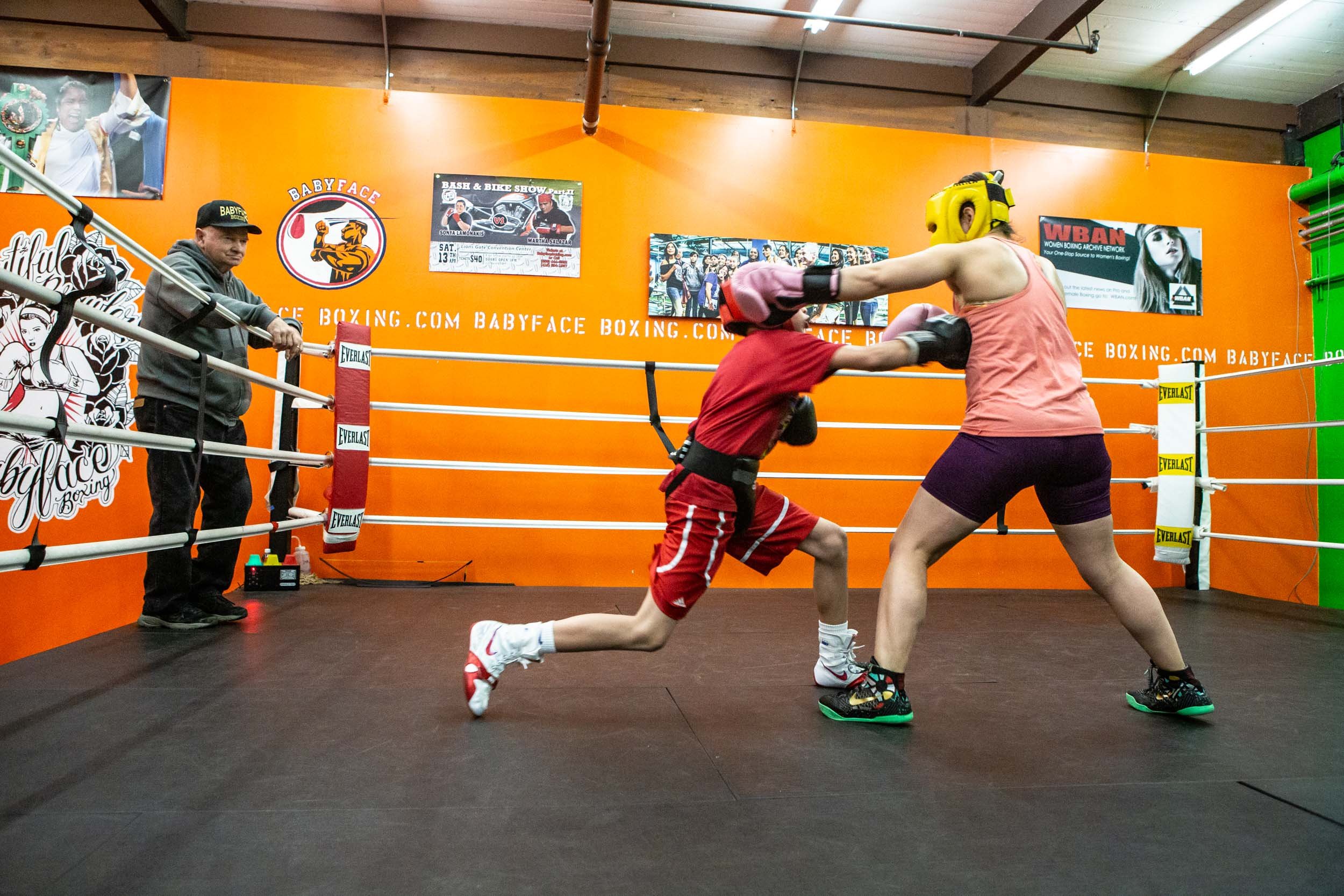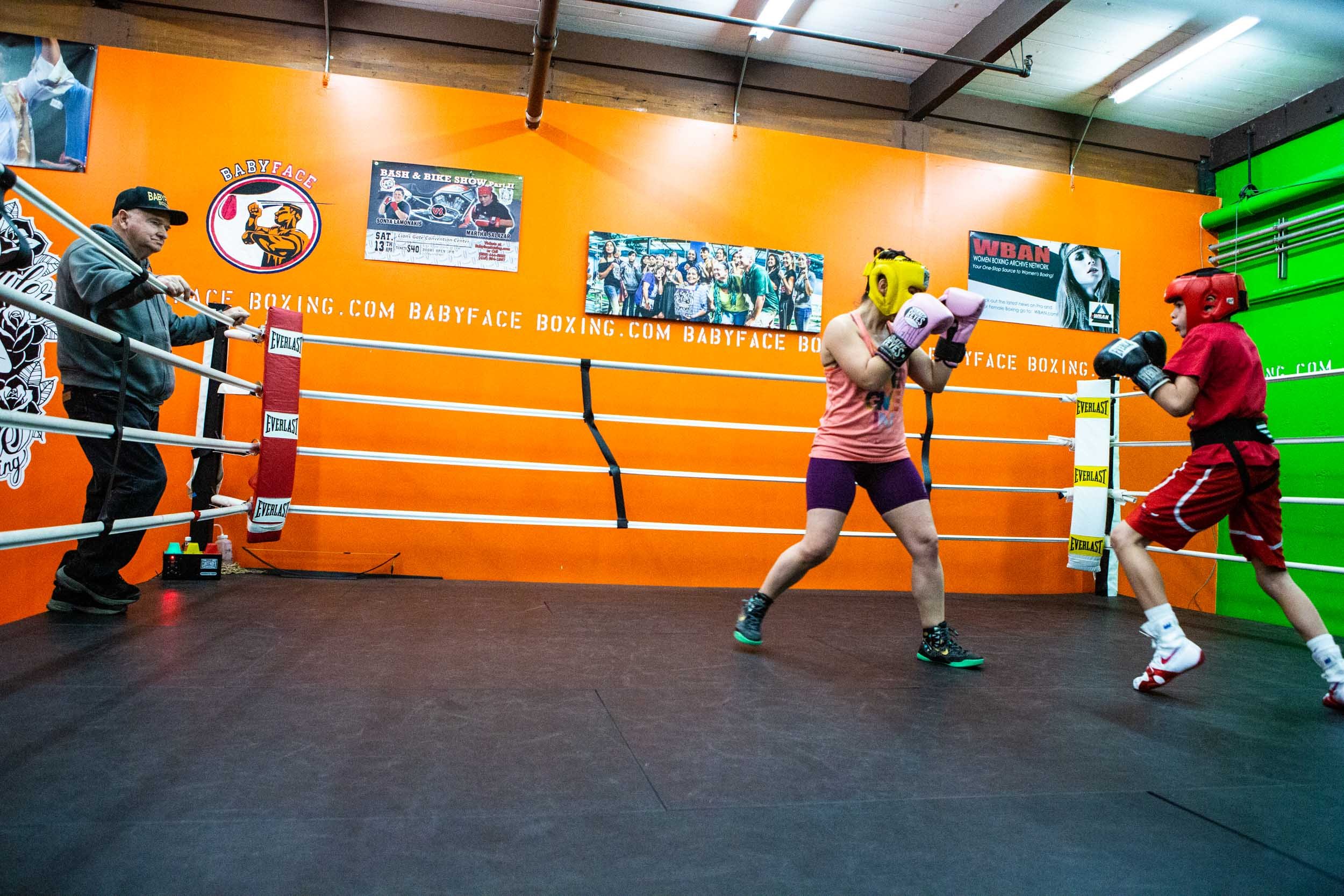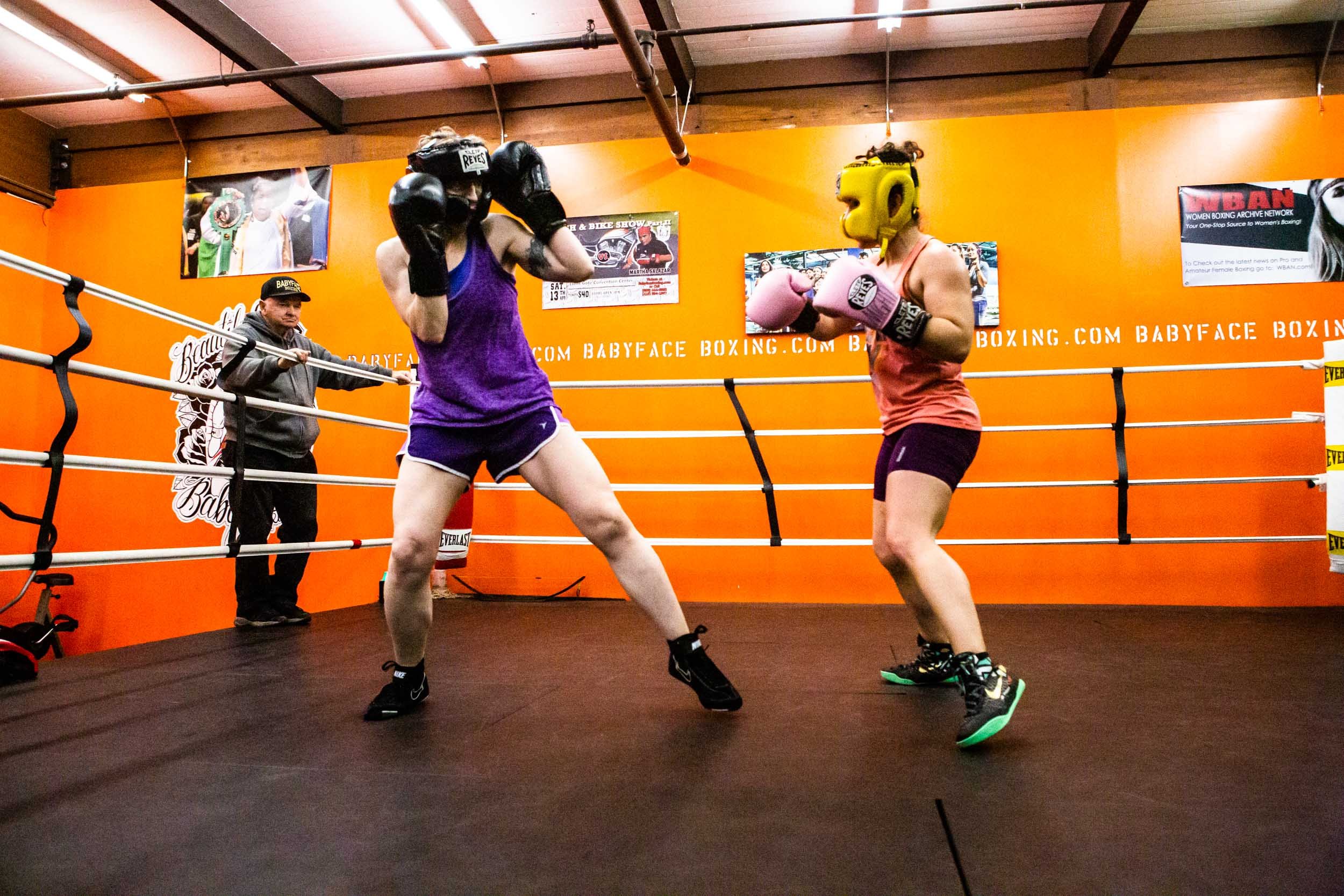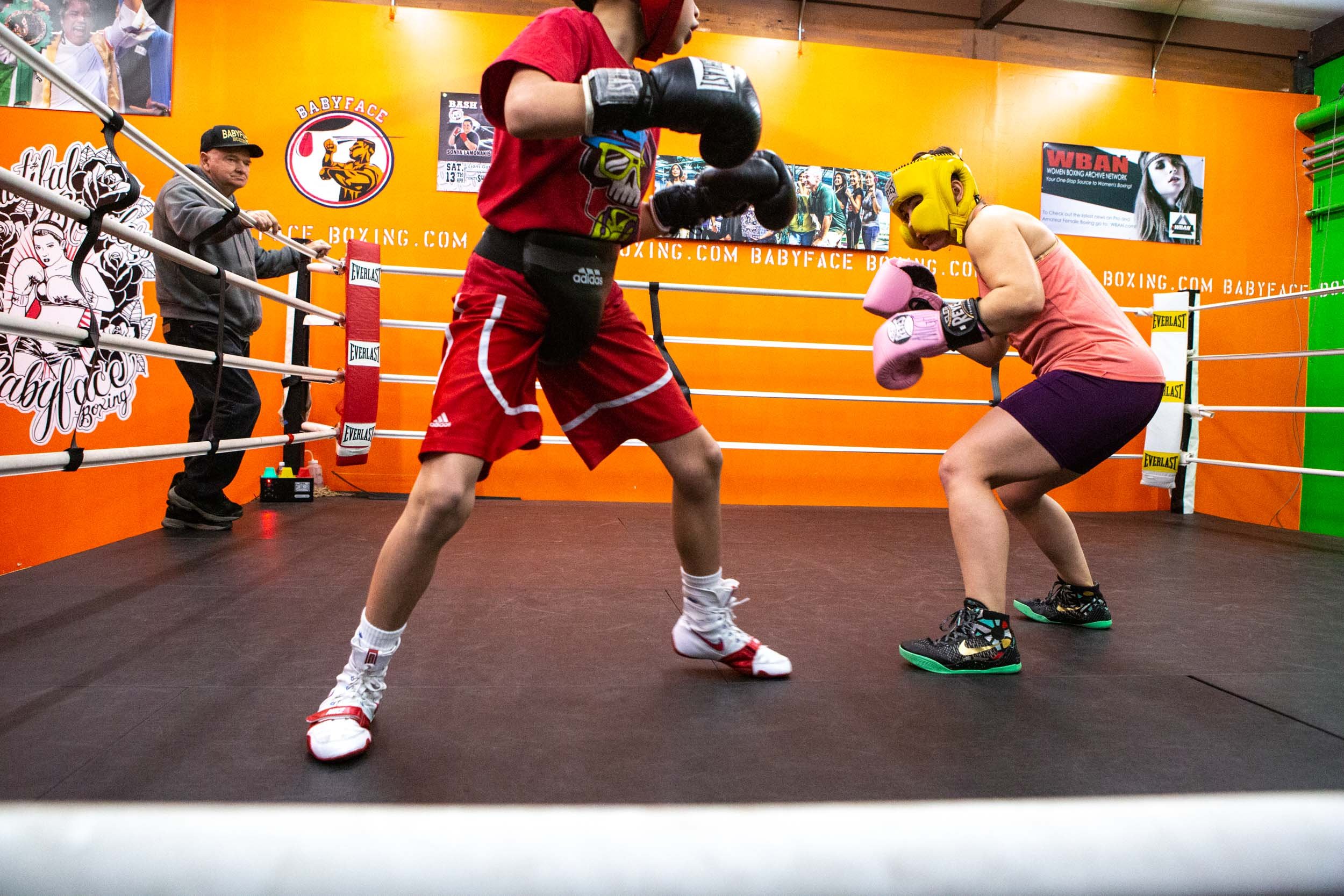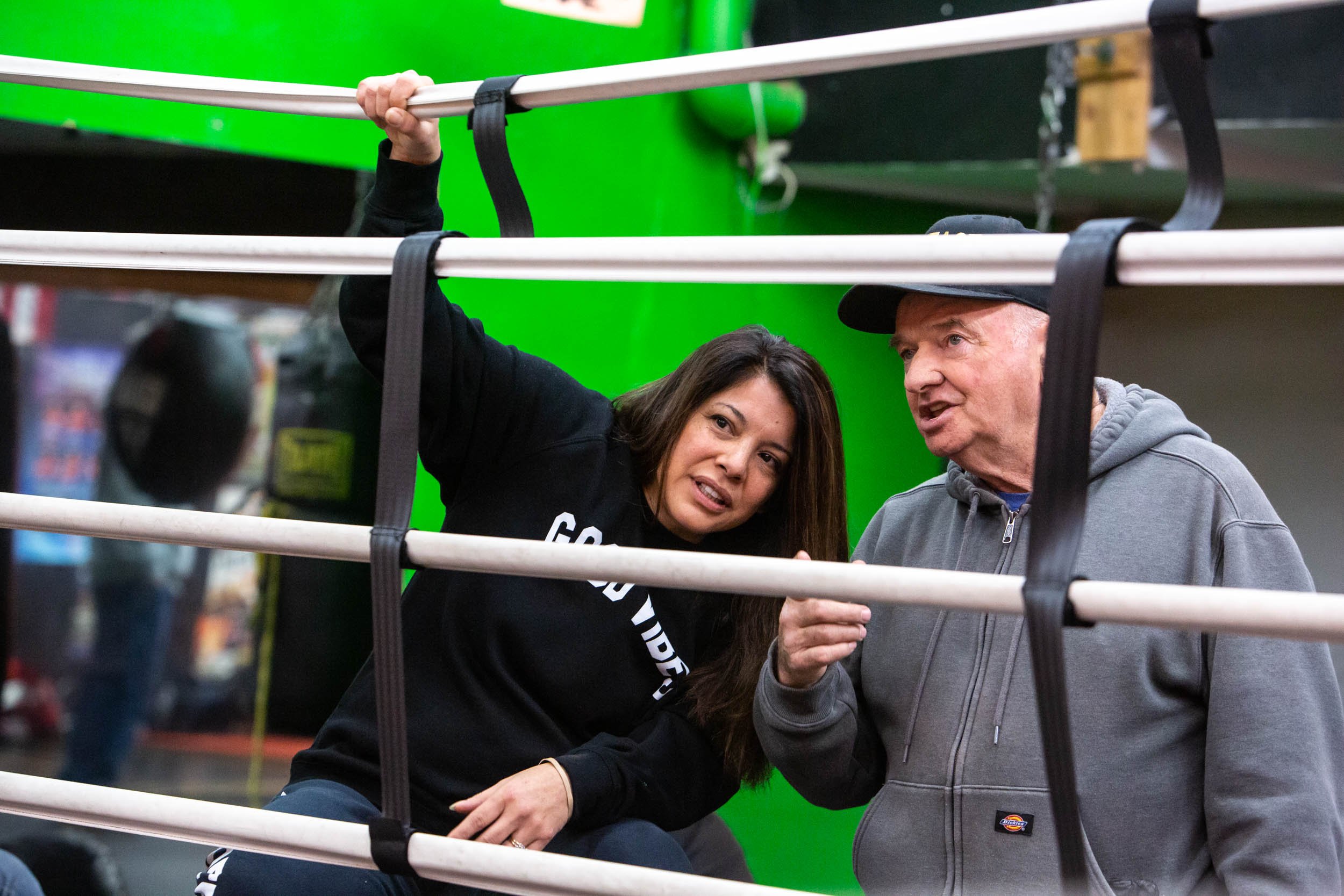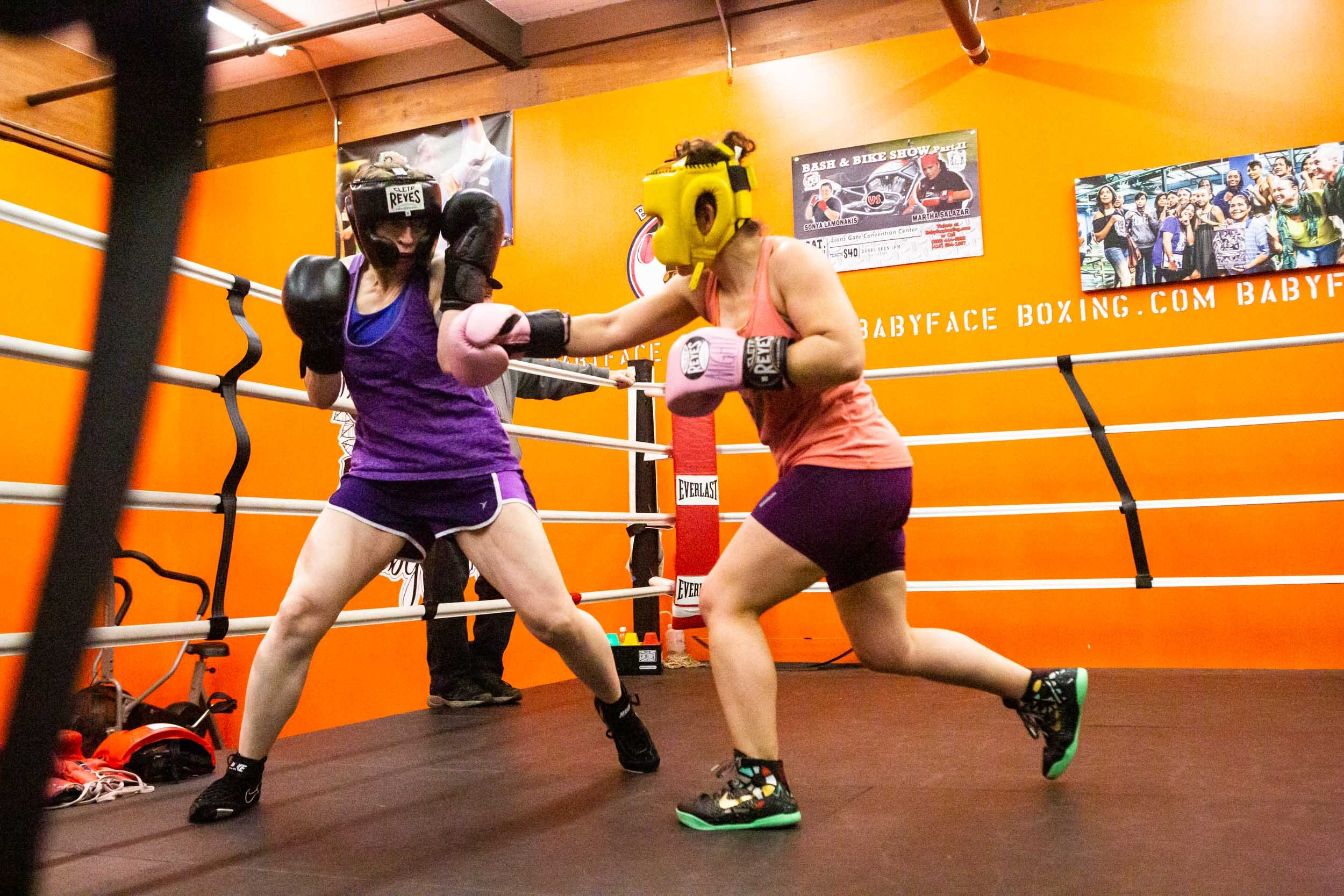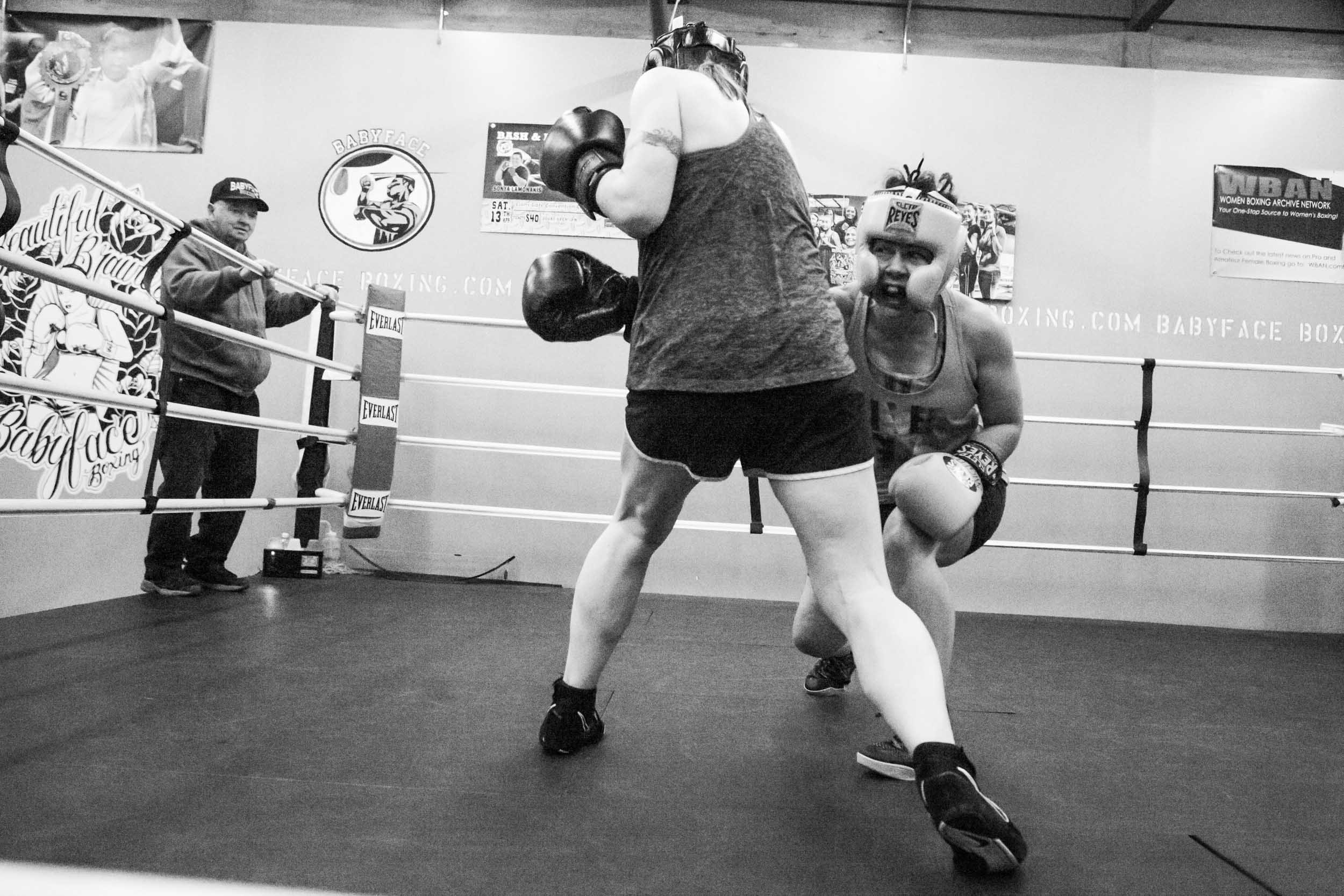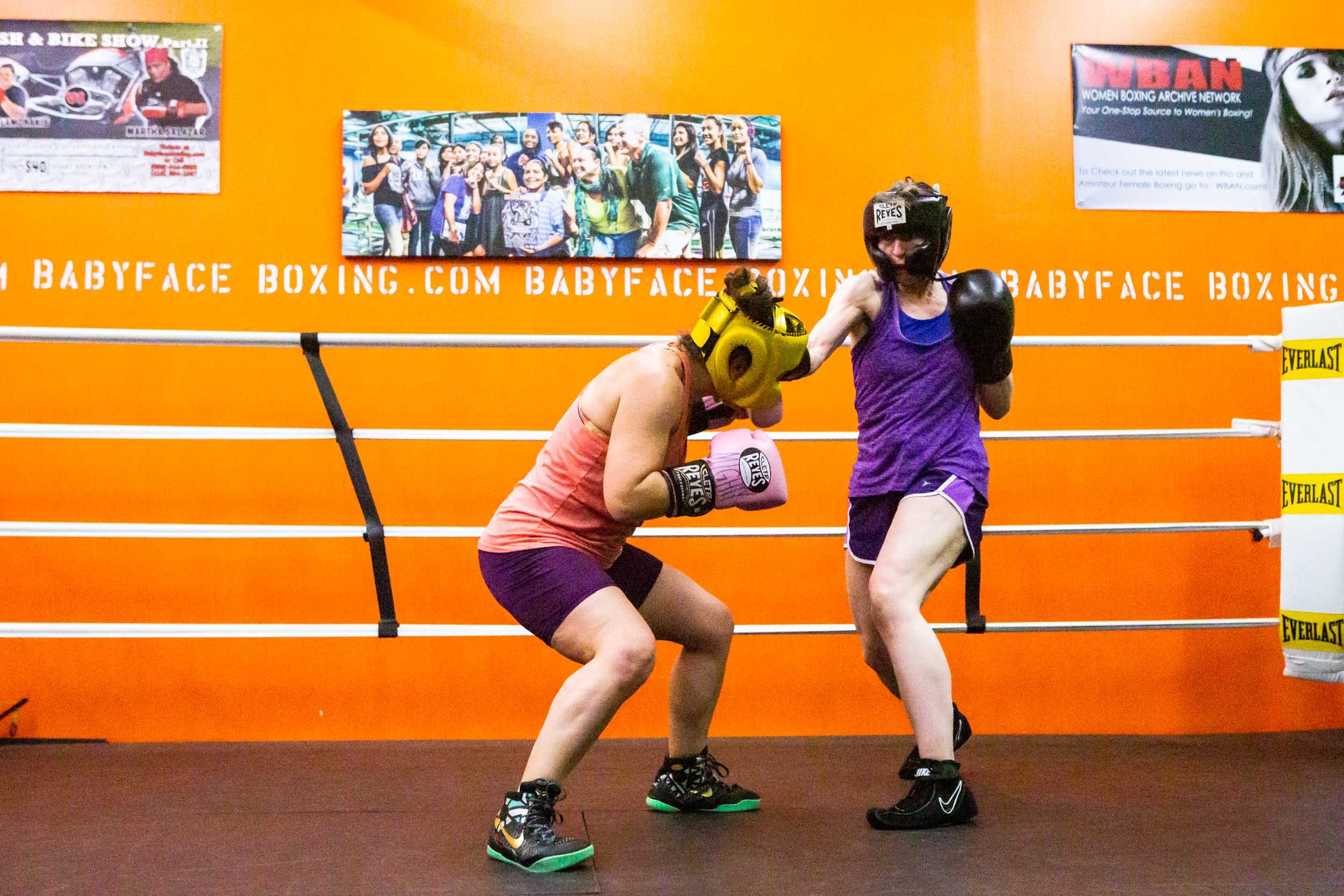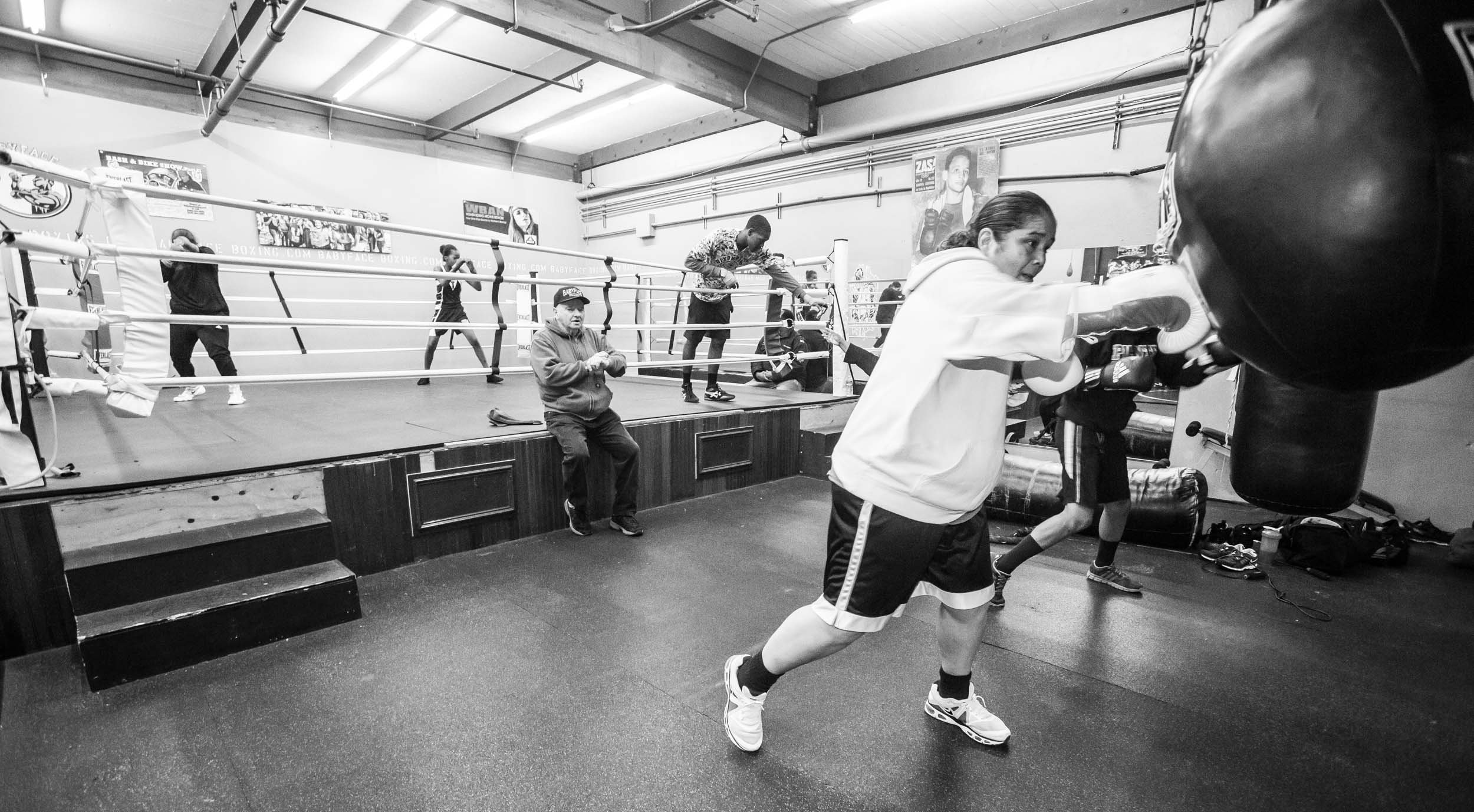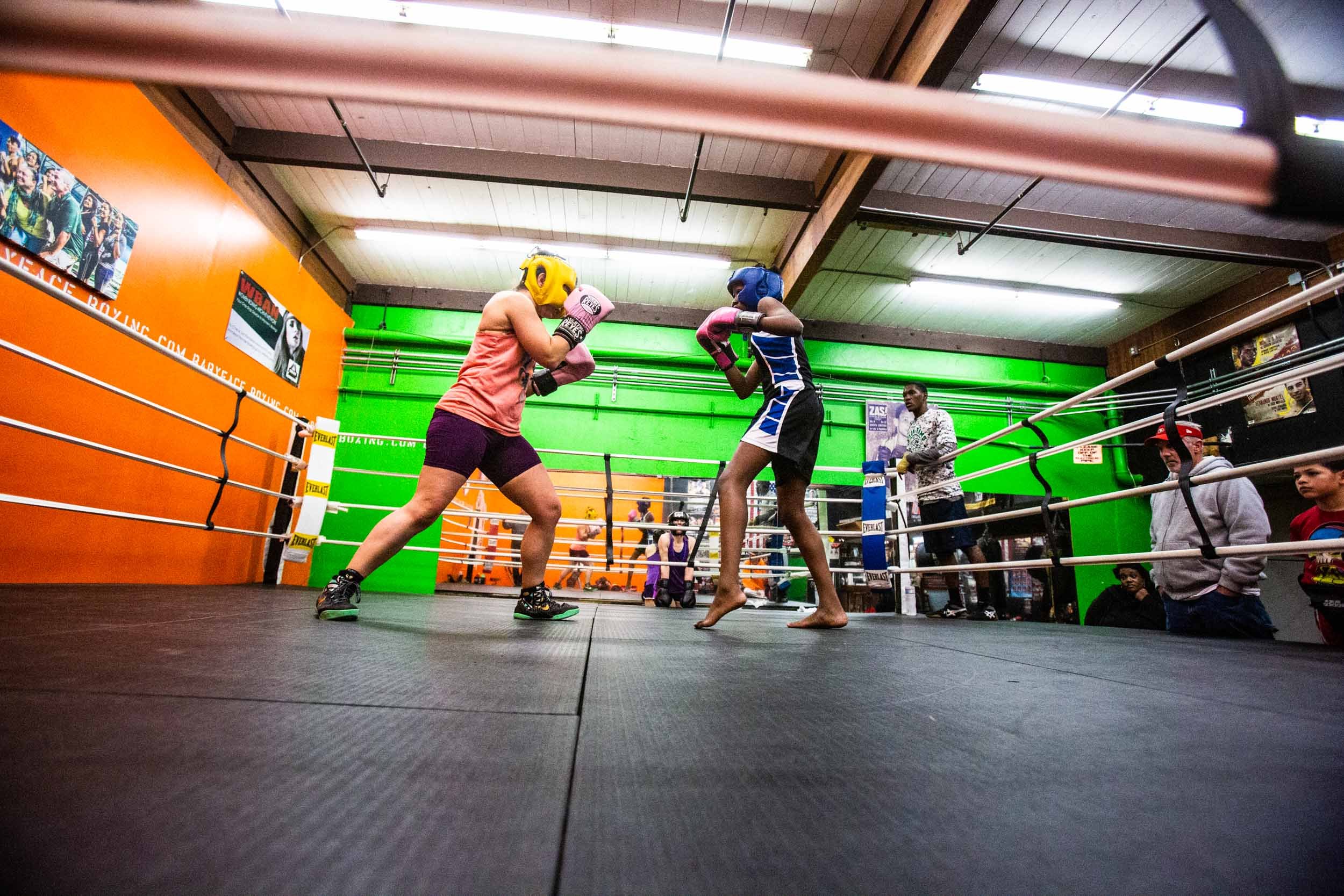“I think that the fighters have been fighting their whole lives. If you’ve already been slapped or punched or hit with a belt, I mean getting in the ring is really not anything different than that.”
— Blanca Gutierrez

Blanca Gutierrez, Beautiful Brawlers Female Boxing Pioneer
Story and photos by Cat Cutillo
Blanca Gutierrez is drinking coffee and getting ready to spend another Saturday filled with blood, sweat and maybe even some tears. She runs a weekly sparring session at her Baby Face Gym in Pacifica, a facility that focuses on bringing female boxers together to train. Through her gym she also created Beautiful Brawlers, an event that showcases female boxing.
She named the gym in tribute to her late father, Javier “Baby Face” Gutierrez, a Pacifica boxing pioneer.
“I grew up watching him jump rope and eating raw eggs,” says Gutierrez. “When your father has a busted nose that’s been busted 20 times and you’re looking at him, you study his face.”
And what Gutierrez saw behind the scars from razor blade cuts to open swollen eyes was something she recognized within herself.
“I lived that life with him and I saw a lot of commitment and glory and I heard all his stories and he’d cry,” says Gutierrez.
Despite her passion, she says her parents never let her play sports growing up.
“I never got to do anything because he thought that sports were for boys,” she says.
So Gutierrez starting fighting secretly when she was 12, in a garage, against her brother’s karate friends.
“It was such a sideshow,” she says. “Just a little funny thing that some girl wanted to fight. I actually beat up people in the garage. There’s one kid that I gave his first beating,” she says.
“I did it because everybody was taunting me, so I beat the hell out of him,” she recalls.
And boxing is not the only place where Gutierrez found herself fighting her way to the top. After Gutierrez graduated from high school in Pacifica, she quickly found work at a brokerage firm as a file clerk. She eventually worked her way up to be a trader and is now one of the senior people.
“I was really aggressive. Probably more like a New Yorker-type aggressive,” says Gutierrez.
By her mid-20’s, she had saved enough money to put herself through college. She enrolled in Skyline College and pursued classes in Women’s Studies and for the first time she had the opportunity to play sports.
She played softball, ran track and set her sights on wrestling. But a traumatic leg injury from a wrestling accident halted things. She had broken her leg in three places. After six months on crutches and many months more of recovery, she went into a kickboxing gym to loose weight.
“I’m there 30 minutes in this class and I go, ‘I want to be a fighter. This is me.’ The teacher looks at me and says, ‘How long have you been doing this for? I say ’Thirty minutes.’ He looks at me and says, ‘You’re out of your mind.’”
Quite the opposite. After six months of training, Gutierrez had her first kickboxing fight and soon made her way onto ESPN’s show “Strike Force,” where she fought against one of her friends. She says she lost that fight in a split decision, but what hurt more was her coach’s reaction while she was waiting to be interviewed by the cameras.
“My coach says, ‘You’re an embarrassment to yourself, to the gym.’ It was a joke,” she recalls. “And he walks away from me.”
She says the cameraperson stepped up for an interview and that she felt a hand on her shoulder. It was her bucket man.
“And he grabbed my shoulder and he goes, ‘Oh yeah, I’m her coach,’” So she had a new coach.
“A lot of times, when you’re a fighter, you see the fighters with their coaches holding the back of them when they come in because it’s a lonely sport. It’s all you. And to have hands on you… That means something,” she says.
Gutierrez’s kickboxing career ended at age 40 after she found out she was pregnant. She now has a daughter and a son, 14 and 13 respectively. She created the gym in 2007 with the needs of women in mind.
“There needed to be some kind of sisterhood or some kind of thing where you bring in the women so we could all spar,” she says. “This is a women’s gym and being a woman fighter is a little different. Kids are allowed in here.”
The gym also trains kids, both boys and girls.
“I get the kids that are either bullied or are loners. And they fit in here so well and they come out of their shell and they’re really good boxers,” she says. “We put them in the ring and they learn how to fight and they feel so much better.”
Eleven-year-old Sativa James and her 17-year-old brother, Jeshon, have been driving the 80-mile commute from Dixon with their parents for two years now to train at the gym.
“Its an environment where my daughter thrives being around great champions and female role models,” says father Michael James.
“Blanca is the biggest ambassador to female boxing. No matter what level the fighters were on, everybody worked together. You don’t find that in gyms. This is a gym where everybody supports everybody and they grow together.”
In fact, the gym has all levels from champions, like heavyweight world champion Martha “The Shadow” Salazar and featherweight world champion Melissa McMorrow to kids who are just putting on gloves for the first time. And perhaps what’s more unusual is they are all sparring with each other.
Gutierrez says that women might have a different approach to fighting than men.
“If you ask a man who spars with their friend in the ring, a lot of times they’ll say they don’t want to fight him because that’s my sparring partner. That’s where women step up,” says Gutierrez. “We’re going to fight because the best have to fight the best. And I don’t think there’s a difference in fighting your friends other than you get bigger hugs at the end of the fight.”
She says many of the fighters have excelled in other sports and are looking for a fresh athletic outlet. Others, she believes, have experienced abuse.
“There are a number of women who have either been sexually abused or physically abused in some manner,” she says. “So it’s a good outlet for them. It makes you feel empowered.
“I think that the fighters have been fighting their whole lives,” she says, explaining that others who grew up disciplined with corporal punishment are also drawn to the sport. “If you’ve already been slapped or punched or hit with a belt, I mean getting in the ring is really not anything different than that.”
She says currently there is a big struggle to get women’s boxing on television and an enormous disparity between what men and women champion boxers are paid.
“A male champion will make upward of $100,000 plus. And you have females in here that are risking their lives, training just as hard, and they’re making $5,000, $6,000.”
Despite the uphill battle, Gutierrez says she’ll keep fighting for equality for her boxing family.
“It’s more than coaching. It’s knowing that people believe in you and people are behind you,” she says. “We give a thousand percent to their cause if they’re worth it. If they believe in themselves then we believe in them more.”
Against the Tide: Beautiful Brawlers




